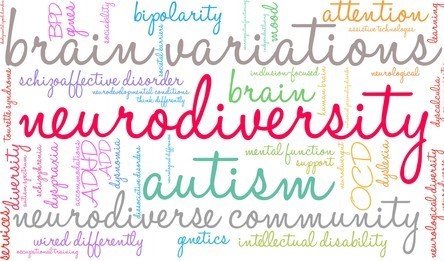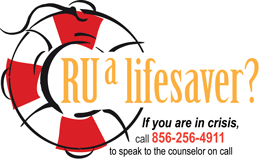Neurodiversity
Neurodiversity
What is neurodiversity?
Neurodiversity refers to the full range of variations in cognition, learning, behavior, and socialization that exists within the population.
In other words, neurodiversity refers to valuing the diversity of human brains, minds and bodies and to recognizing differences as a natural human variation. Neurodiversity is not a theory, it is a fact. We all have differences!
Neurodiversity terms and definitions:
Neurodivergent (and Neurodivergence)
Neurodivergent (and Neurodivergence) – “having a mind that functions in ways that diverge significantly from the dominant societal standards of ‘normal’” (Walker, 2014).
Neurotypical
Neurotypical – “having a style of neurocognitive functioning that falls within the dominant societal standards of “normal” (Walker, 2014).
Neurodiverse
Neurodiverse – “A group of people is neurodiverse if one or more members of the group differ substantially from other members, in terms of their neurocognitive functioning” (Walker, 2014).
Neurodiversity movement
Neurodiversity movement –“a social justice movement that seeks civil rights, equality, respect, and full societal inclusion for the neurodivergent” (Walker, 2014). The movement is based on a philosophy for embracing different ways of thinking and behaving as normal variations of being human. The term was coined by autistic self- advocate Judy Singer in the late 1990's.
Neurodiversity Paradigm
Neurodiversity Paradigm – “specific perspective on neurodiversity – a perspective or approach that includes these fundamental principles:
- Neurodiversity is a natural and valuable form of human diversity.
- The idea that there is one “normal” or “healthy” type of brain or mind or one “right” style of neurocognitive functioning, is a culturally constructed fiction, no more valid (and no more conducive to a healthy society or to the overall well-being of humanity) than the idea that there is one “normal” or “right” ethnicity, gender, or culture.
- The social dynamics that manifest in regard to neurodiversity are similar to the social dynamics that manifest in regard to other forms of human diversity (e.g., diversity of ethnicity, gender, or culture). These dynamics include the dynamics of social power inequalities, and also the dynamics by which diversity, when embraced, acts as a source of creative potential” (Walker, 2014).
Resources
Campus Resources
The Neurodiversity Center https://sites.rowan.edu/neurodiversity/
The Autism PATH Program https://sites.rowan.edu/oca/resources-for-students-with-disabilities.html
The Office of Accessibility https://sites.rowan.edu/accessibilityservices/
Student Neurodiversity Club https://sites.rowan.edu/neurodiversity/student-neurodiversity-club.html
Neurodiversity Faculty and Staff Affinity Group https://sites.rowan.edu/neurodiversity/nd-affinity-group.html
College Compass https://sites.rowan.edu/accessibilityservices/_docs/college-compass-2023-flyer.pdf
Creating a Neuro-Inclusive Workplace Certificate Program https://sites.rowan.edu/neurodiversity/professional-development-and-programming.html
Neurodiversity Resources
Books, Articles, and More
- Armstrong, T. (2010). Neurodiversity: Discovering the extraordinary gifts of autism, ADHD, dyslexia, and other brain differences. Da Capo Lifelong.
- Armstrong, T. (2012). Neurodiversity in the classroom: Strength-based strategies to help students with special needs succeed in school and life.
- Hallowell, E. and Rately, J. (2011) Driven to Distraction: Recognizing and Coping with Attention Deficit Disorder. Anchor.
- Peterson, M. (2021) The Dyslexia Guide for Adults: Practical Tools to Improve Executive Functioning, Boost Literacy Skills, and Develop Your Unique Strengths. Rockridge Press.
- Pollak, D. (2009). Neurodiversity in higher education: Positive responses to specific learning differences. Wiley-Blackwell.
- Ramudo, P. and Kelly, K. (2006) You Mean I'm Not Lazy, Stupid or Crazy?!: The Classic Self-Help Book for Adults with Attention Deficit Disorder (The Classic Self-Help Book for Adults w/ Attention Deficit Disorder) Scribner.
Organizations and Groups
ADDitude http://www.additudemag.com/
ADHD Coaches (ACO) http://www.adhdcoaches.org/
Asperger/Autism Network (AANE) www.aane.org
Asperger Autism Spectrum Education Network (ASPEN) www.aspennj.org
Asperger Syndrome and High Functioniing Autism Association (AHA) www.ahany.org
Association for Science in Autism Treatment www.asatonline.org
Attention Deficit Disorder Association (ADDA) http://www.add.org/
Autism New Jersey www.autismnj.org
Autism Society of America www.autism-society.org
Autism Speaks www.autismspeaks.org
Autism Spectrum Coalition www.aspergersyndrome.org
Children and Adults with ADHD (CHADD) http://www.chadd.org/
College Autism Spectrum (CAS) - College Autism Spectrum
Global and Regional Asperger Syndrome Partnership (GRASP) www.grasp.org
Integrate Autism Employment Advisors www.integrateadvisors.org
International Dyslexia Association (IDA) http://www.interdys.org/
National Association for Dually Diagnosed (NADD) www.thenadd.org
The National Autistic Society (NAS; United Kingdom) www.autism.org.uk
National Resource Center on ADHD http://www.help4adhd.org/
National Autism Center www.nationalautismcenter.org
Organization for Autism Research (OAR) www.researchautism.org
Stairway to STEM Stairway to STEM | Resources for Autistic Students Going to CollegeApps
Forest App
Forest is an app that helps you stay focused on the important things in life. Whenever you want to stay focused, plant a tree. Users can earn credits by not using their cell phones and plant real trees around the world with the credits. With Forest, users can have a delightful experience to spend less time on their cell phones, focus on what's more important in their lives, and keep our environment green.
Habitica
Habitica is a free habit-building and productivity app that treats your real life like a game. With in-game rewards and punishments to motivate you and a strong social network to inspire you, Habitica can help you achieve your goals to become healthy, hard-working, and happy.
Natural Reader
Natural Reader does the opposite of voice-to-text apps. Simply upload required school reading in Word, PDF, e-book, or PowerPoint format, and the app will read it aloud. People who experience difficulty sitting still can go on a walk or do chores while they absorb information.
Text to Speech App Download (naturalreaders.com)
Open Dyslexic
OpenDyslexic is a typeface designed against some common symptoms of dyslexia. If you like the way you are able to read this page, and others, then this typeface is for you!
OpenDyslexic is a typeface designed against some common symptoms of dyslexia. If you like the way you are able to read this page, and others, then this typeface is for you!
TickTick
TickTick gives you a solid, simple to-do list app organized around lists, tasks, and tags—but some additional features make it much more ADHD-friendly than others in its category.
TickTick:Todo list, checklist and task manager app for Android, iPhone and Web



